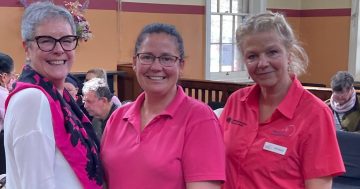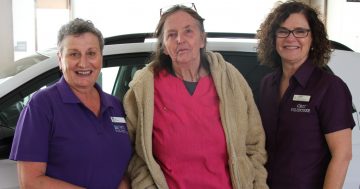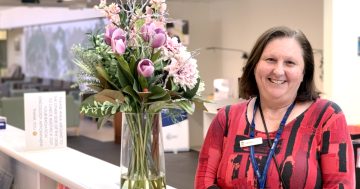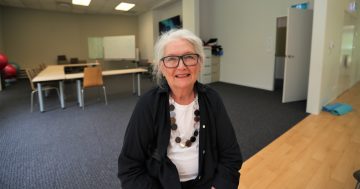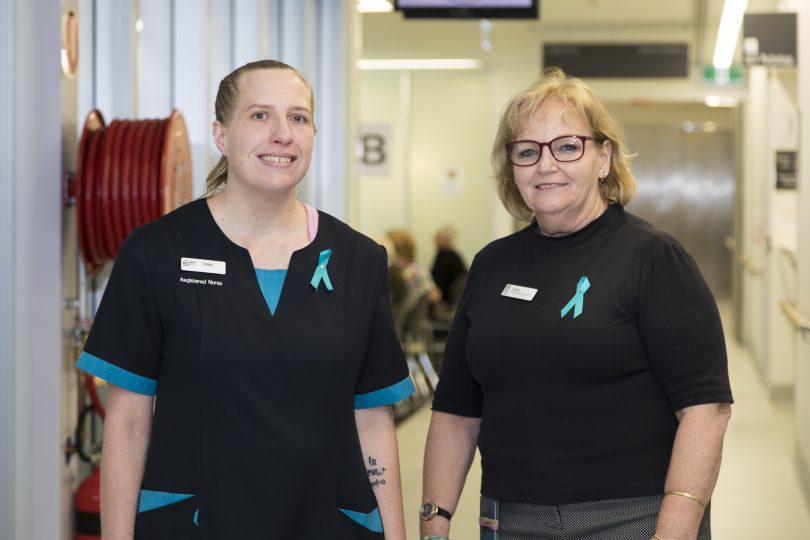
Cancer survivor Emma Kemp with Nurse Specialist Chris Twyford at Canberra Hospital. Photo: Michelle Kroll, Region Media.
Emma Kemp knows she is one of the lucky ones. Not only did she beat ovarian cancer, but she did not lose her fertility in the process.
The 33-year-old University of Canberra Hospital nurse is now paying it forward, getting the message out about a disease that is often detected late and only has a 46 per cent five-year survival rate, compared with breast cancer’s 91 per cent five-year survival rate.
It’s a journey that has taken her completely out of her comfort zone, spending much of February talking about her experience as part of Ovarian Cancer Month.
It’s mostly a message of hope, but there is a fire in the belly as well about making more people, especially younger women, aware of the disease and advocating for them and more research.
A risk factor is age, with women over 50 more likely to get ovarian cancer, but Emma wants them to know that it can and does affect younger women like her, threatening their ability to have children, as well as their life.
She also says women need to be their own best advocate, to persist when something doesn’t feel quite right as the disease’s symptoms can be so vague.
“My relationship with cancer has changed over time. Initially, it was shock and undergoing treatment, and fear of recurrence,” Emma says.
“But now I see myself in a position where I can be in more of an advocacy role, as much as it hurts to recall the story of my diagnosis and treatment because this 46 per cent survival rate is rubbish. Ovarian cancer awareness needs to get out there so people don’t find out about it like I did.”
It was near her 25th birthday in 2011, while she was still a Navy sonar and radar operator, when she got the call telling her that testing after fibroid surgery on 1 December had revealed Stage 3 ovarian cancer.
She had experienced typical symptoms – fatigue, bloating, frequent urination, changes in her menstrual cycle – but had dismissed them as many do, attributing them to gym work, drinking too many fluids, and the Depo Provera medication she was taking.
Concern over a mass in her pelvis was enough to make her see her GP, but even then cancer was not on the table.
She lost her left ovary and left fallopian tube, but the surgery spared her right ovary, fallopian tube and uterus. Upon receiving her diagnosis, she embarked on three cycles of chemotherapy at Canberra Hospital on 27 December in the same cancer ward that has recently been refurbished.
And while staff and her oncologist gave her all the literature and information about the disease, the possibility of more surgery and medications and their side-effects, none of it sunk in.
“I was still in shock,” she recalls. “I also felt very isolated because I was a 25-year-old woman diagnosed with ovarian cancer and potentially robbed of my fertility as well.”
She had a general understanding that chemo would leave her tired and she would lose her hair but the biggest impact was the change to her taste perceptions and loss of appetite.
“Throughout my chemotherapy, the nursing team at Canberra Hospital showed me so much compassion. They helped me work through my fears and even brought a birthday cake for my 25th birthday,” she says.

Emma Kemp during her treatment at the Canberra Hospital, with a birthday cake presented to her by staff. Photo: Supplied.
By mid-February 2012 it was over and she has been clear of the disease ever since.
“Most ovarian cancer sufferers have a high percentage of recurrence so I am very fortunate to have had one that’s treatable and has a low chance of recurrence,” she says.
A year after her diagnosis, Emma received her open water diving certificate, which is significant as there was a chance the chemotherapy would affect her lungs, “so I can have a good anniversary at that time of year in addition to my awful diagnosis,” she says.
“It give me such a sense of freedom that I’ve beaten something unique like ovarian cancer, and it’s so pretty and peaceful under the water.”
Nurse Specialist Christ Twyford has been at Canberra Hospital since 2004 and says treatment approaches and relationships with cancer patients have changed for the better, with more targeted therapies and better outcomes.
“The patients are more supported, we don’t think of them as sick patients all the time,” she says. “One patient didn’t think I was her coordinator, I was her friend. That’s special.
“You try to demystify, smooth the journey, be there in whatever way you can, to be that point of contact.”
Chris says it is important that patients have choice and that they have an advocate to help them through such a difficult journey.
She also says ovarian cancer needs a higher profile with as much awareness-raising as breast cancer has so there can be earlier detection, so women are not diagnosed as often in the disease’s later stages.
“These symptoms can be rationalised,” Chris says. “The take-home message is don’t write them off. If you have them, investigate. It’s better to investigate early and find out what you’re dealing with.”
For further information about ovarian cancer, visit Ovarian Cancer Australia.











